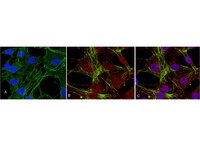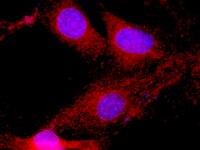Delayed mammary gland involution in MMTV-AKT1 transgenic mice.
Ackler, S; Ahmad, S; Tobias, C; Johnson, MD; Glazer, RI
Oncogene
21
198-206
2002
Show Abstract
AKT1/protein kinase Balpha is a protein-serine/threonine kinase that regulates multiple targets involved in cell survival and cell cycle progression in a variety of cell types including breast cancer cells. To explore the role of Akt1 in mammary gland function and tumorigenesis, transgenic mice were generated that express human AKT1 under the control of the MMTV promoter. Virgin transgenic mice did not exhibit a dominant phenotype, but upon cessation of lactation, a notable delay in involution occurred compared to age-matched non-transgenic mice. The delay in involution coincided with increased hyperplasia as evidenced by an increased number of binucleated epithelial cells and a marked elevation in cyclin D1 expression in mammary epithelium. The delayed involution phenotype corresponded to increased phosphorylation of Thr308 in AKT1 and Ser136 in BAD, but not phosphorylation of Ser21 in GSK-3alpha. There was no evidence of mammary dysplasia or neoplasia during the lifespan of multiparous transgenic mice. These data suggest that AKT1 is involved in cell survival in the lactating and involuting mammary gland, but that overexpression of AKT1 alone is insufficient to induce transformation. | 11803463
 |
Specific binding of the Akt-1 protein kinase to phosphatidylinositol 3,4,5-trisphosphate without subsequent activation.
James, SR; Downes, CP; Gigg, R; Grove, SJ; Holmes, AB; Alessi, DR
The Biochemical journal
315 ( Pt 3)
709-13
1996
Show Abstract
Recent evidence has suggested that activation of phosphoinositide 3-kinase (PI 3-kinase) is required for the activation of Akt-1 by growth factors and insulin. Here we demonstrate by two independent methods that Akt-1 from L6 myotubes binds to PtdIns(3,4,5)P3, PtdIns(3,4)P2 and PtdIns(4,5)P2 when presented against a background of phosphatidylserine (PtdSer) or a 1:1 mixture of PtdSer and phosphatidylcholine (PtdCho). No binding was observed with the lipids PtdIns(3,5)P2, PtdIns4P and PtdIns3P or background lipids. Activated, hyperphosphorylated forms of Akt-1 from insulin-stimulated L6 myotubes bound to PtdIns(3,4,5)P3 in a similar manner as inactive Akt-1. Quantitative analysis using surface plasmon resonance showed that the equilibrium association constant for the binding of Akt-1 to PtdIns(3,4,5)P3 was submicromolar and that PtdIns(3,4)P2 and PtdIns(4,5)P2 bound to Akt-1 with 3- and 6-fold lower affinities respectively. Interaction of Akt-1 with PtdIns(3,4,5)P3 did not activate the protein kinase activity, either before or after incubation with MgATP. A model is presented in which PtdIns(3,4,5)P3 may prime Akt-1 for activation by another protein kinase, perhaps by recruiting it to the plasma membrane. | 8645147
 |
Mechanism of activation of protein kinase B by insulin and IGF-1.
Alessi, D R, et al.
EMBO J., 15: 6541-51 (1996)
1996
Show Abstract
Insulin activated endogenous protein kinase B alpha (also known as RAC/Akt kinase) activity 12-fold in L6 myotubes, while after transfection into 293 cells PKBalpha was activated 20- and 50-fold in response to insulin and IGF-1 respectively. In both cells, the activation of PKBalpha was accompanied by its phosphorylation at Thr308 and Ser473 and, like activation, phosphorylation of both of these residues was prevented by the phosphatidylinositol 3-kinase inhibitor wortmannin. Thr308 and/or Ser473 were mutated to Ala or Asp and activities of mutant PKBalpha molecules were analysed after transfection into 293 cells. The activity of wild-type and mutant PKBalpha was also measured in vitro after stoichiometric phosphorylation of Ser473 by MAPKAP kinase-2. These experiments demonstrated that activation of PKBalpha by insulin or insulin-like growth factor-1 (IGF-1) results from phosphorylation of both Thr308 and Ser473, that phosphorylation of both residues is critical to generate a high level of PKBalpha activity and that the phosphorylation of Thr308 in vivo is not dependent on phosphorylation of Ser473 or vice versa. We propose a model whereby PKBalpha becomes phosphorylated and activated in insulin/IGF-1-stimulated cells by an upstream kinase(s). | 8978681
 |













